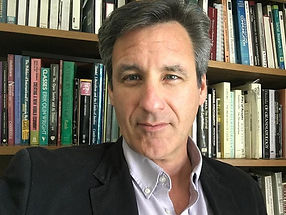Chad Raphael: News, Democracy and Activism
Dr. Chad Raphael is a communications professor and former chair of the Communications Department at Santa Clara University. Dr. Raphael has written dozens of publications on a wide variety of topics including politics, environmental ethics, media, education, and communication; and published his most recent book in 2014 called “Deliberation, Democracy, and Civic Forums.”
In this broad conversation, we cover Dr. Raphael’s career path, the most effective ways to spur political change, why he published his most recent book, how to engage with the news in our current political climate, and much more.

Selected Interview Highlights
Gavin Cosgrave: What would you tell a student who is passionate about political reform of some type but feels like they don’t have much power or know where to start?
Chad Raphael: Find organizations where you can get actively involved. Go to meetings and meet people who care about the same issues you do. That will sustain your activism and make it a socially and culturally meaningful experience.
GC: What were your career plans in college?
CR: If someone asked me what career I was going to try when I got out of school, I would have said acting. But when I got out, one of the first jobs I got was working for an affordable housing organization that was started by the hotel workers’ local union in Boston. I did tenant organizing and got really interested in city politics through that. There was a brilliant union president who knew how work through the news media to publicize what was going on with workers and their struggles. That drew me back to grad school, and I was interested in how community organizations could use the news media more effectively.
GC: What strategies do you recommend to help people stay engaged with the news without becoming discouraged or overwhelmed?
CR: One of the first assignments that students do in my news and democracy class is keep an inventory of all the news they consume for a week. They write down the headlines of the stories, what news sources, what they feel they learned, and how it made them feel. Then we step back and look for patterns like “am I only looking at national news,” “am I only looking at news about President Trump’s tweets,” “what’s missing from my news diet?” Then we craft a plan for an ideal news diet, with different sources.
I introduce a number of sources of exclusively positive news. There are providers out there who solely focus on solutions-oriented journalism, so not just on the problem, but on people who are trying an approach to address a social issue (Raphael recommends The Solutions Journal and Yes! Magazine). At the end of the course, students make proposals for reforming journalism in ways that would strengthen democracy. We don’t just point to all the problems, we think about what we could do to improve journalism and political communication.
GC: If you could have dinner with anyone from history, who would you choose?
CR: I suppose it would be Mahatma Gandhi. I would ask him, “How did you go through your entire life without fighting back? How did you maintain a nonviolent approach when you were so aware of the injustice that was happening under colonialism? How did you have the self-discipline never to waver from that?” I think that’s an amazing accomplishment.
GC: What advice would you give to a first-year student?
CR: Stretch yourself. Don’t worry so much about the difference between and A- and a B+, worry more about searching for what you should be doing next in the world. Take courses and engage in extracurricular activities that will help you discover your passion.
GC: What book would you recommend that every college student read?
CR: One book that we read in my News and Democracy called Blur, by Bill Kovach and Tom Rosenstiel. They walk people through what to expect from good journalism and how to distinguish between more and less credible journalism. I think it’s really accessible and the students in my class get a lot out of it and feel like they can read the news much more critically than before.
GC: If you could send a message to every person in the United States, what would you say?
CR: Get off Twitter and go talk to people face to face. Get into a small group of people who live where you live and work on having a civil conversation about the problems facing all of us and what we can do about them. Stop following celebrities who just struggle with each other, stop focusing on what the president is tweeting and what people are tweeting back, it’s all noise. Go talk to real people and figure out what to do.


